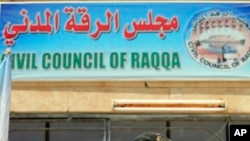A U.S.-backed Syrian group known as Civil Council of Raqqa granted amnesty to 96 alleged members of the Islamic State (IS) on Wednesday in what it said was an attempt to dissuade low-ranking IS members from allegiance to the terror group.
The council, which is expected to rule Raqqa after IS is removed from its self-proclaimed capital, said the release included only local IS members who have not engaged in crimes and militant activities.
“We made that decision to encourage trust between our community and [help] return tolerance between its groups,” Ibrahim al-Issa, head of the Civil Council of Raqqa, told VOA.
Al-Issa said the pardoned people were all men, of different ages, who were residents of Raqqa and its countryside and held no posts with IS.
“Those people were somehow involved with IS or had close ties to IS members,” he said, adding that no foreign IS members were among those granted amnesty, and that the council’s decision was welcomed by tribal leaders of Raqqa and the U.S.-backed Syrian Democratic Forces (SDF).
Council makeup
The Civil Council of Raqqa was formed by the SDF on April 18, several weeks before their major operation in the IS stronghold Raqqa. It consists of roughly 120 members who are mostly from the Arab tribes of Raqqa, but Kurds and Christians also have representation in the council.
The U.S.-led coalition against IS has commended the interim council for its “great work" in assisting displaced residents and has expressed its willingness to support the council to secure gains made by U.S.-backed forces in Raqqa.
The council’s decision comes as the SDF group, supported by the U.S.-led coalition airstrikes, has made significant gains against besieged IS fighters in their grueling and fierce offensive to seize the terrorist stronghold.
The council members told VOA that most of the pardoned IS men had surrendered to the SDF during its recent advances.
A VOA reporter who was present said the alleged IS prisoners were transported to the headquarters of the council in the village of Ain Issa, a town about 45 kilometers (30 miles) north of Raqqa. Hundreds of family members gathered around the council’s building in the early morning to celebrate the men's release.
'New beginning' in Raqqa
Before they were allowed to join their families, the men lined up neatly in front of the council building as council members addressed the crowd, speaking about a "chance for a new beginning" in Raqqa after IS.
The pardoned men, who said they had been forced to pledge allegiance to IS, denounced the group and promised to help rebuild the city after its recapture.
“Those young men have joined Daesh [IS] because of its brutal control or because of hunger,” Rashid Ahmed, who was among the released men, told VOA, using an Arabic acronym for IS. “I was forced to join Daesh to study Sharia.”
Ahmed said he surrendered to the SDF last month after refusing to fight with the IS militants. “I was imprisoned by [SDF] friends for 15 days,” Ahmed said.
It is not the first time that the Civil Council of Raqqa has released alleged members of the jihadi group. In June, the council pardoned 83 men in a similar fashion. The youngest of those pardoned prisoners was 14 years old, Reuters news agency reported at the time.
Ibrahim Al-Assil, a Syria expert with the Middle East Institute in Washington, D.C., told VOA that pardoning alleged IS members is an attempt by the council to gain sympathy of local residents as the SDF offensive enters more crowded neighborhoods of Raqqa.
“To win the fight against ISIS, the SDF needs to win the civilians over,” Al-Assil told VOA.
IS has tried to retain support in Raqqa by scaring residents that U.S.-backed forces may seek revenge from the civilians upon their arrival.
He said the process of justice and accountability for local residents who lived under IS can be a complicated task, adding that many Raqqa residents have complained about the arrest of civilians who had no ties to IS.
“It's a fine balance,” Al-Assil said. "The SDF should make sure it doesn't arbitrarily detain people, doesn't release criminals, and builds a good relationship with civilians to make the fight to liberate the city less difficult.”







